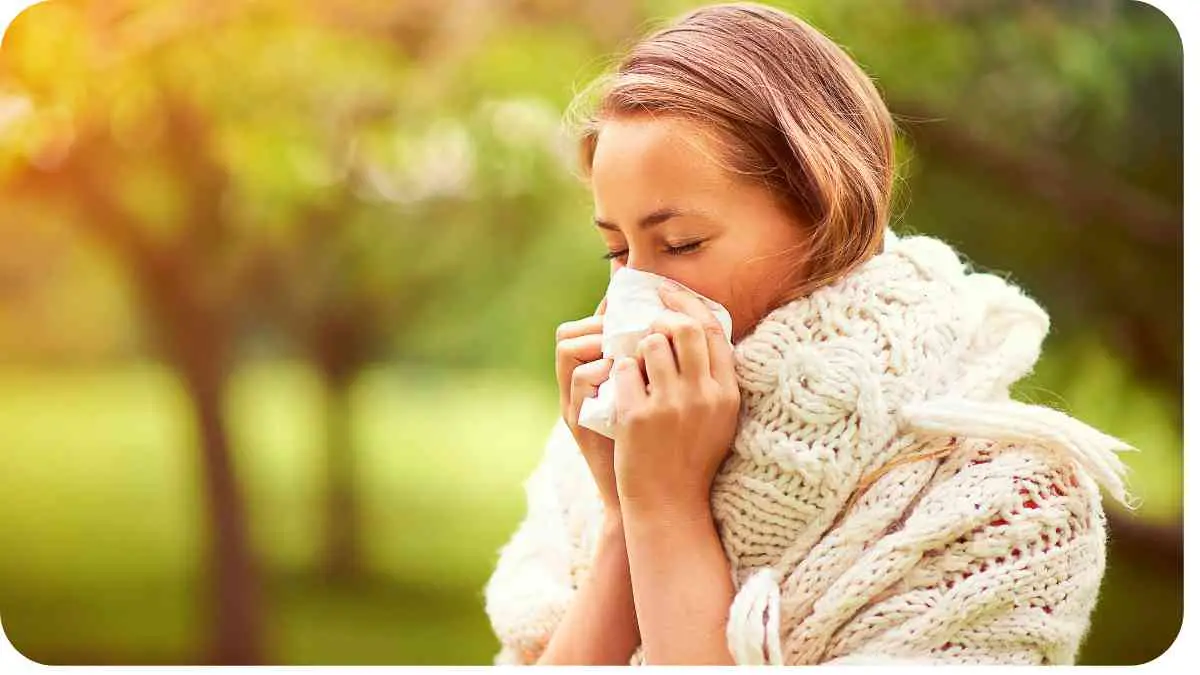Mowing the lawn can be a daunting task, particularly for those prone to allergies. This comprehensive guide offers insights into understanding and managing grass allergies while maintaining your lawn. From identifying common triggers to implementing effective prevention strategies, we’ll explore everything you need to know to minimize allergy symptoms and ensure a pleasant mowing experience.
For those interested in unconventional methods of lawn care, our post on Can Soap Help My Lawn? Expert Recommendations explores the use of soap as a lawn care product.
And if you’re curious about the exercise benefits of lawn care, our post on Can Mowing the Lawn Help You Lose Weight? Fitness Expert Advice provides tips on maximizing the workout potential of lawn care.
| Takeaway |
|---|
| Mowing the lawn can cause allergies due to pollen released during grass blooming season. |
| Grass allergies can cause symptoms such as sneezing, runny nose, itchy eyes, and throat irritation. |
| To prevent grass allergies, stay indoors during peak allergy season, wear a mask while outside, and keep windows closed. |
| Treatment options for grass allergies include over-the-counter antihistamines and even immunotherapy. |
| While grass allergies are generally not considered dangerous, severe reactions are possible in rare cases. If you experience severe symptoms, seek medical attention immediately. |
Explore our comprehensive resources on lawn care and maintenance to keep your lawn healthy and beautiful, without sacrificing your own health and well-being.
Can Mowing The Lawn Cause Allergies?
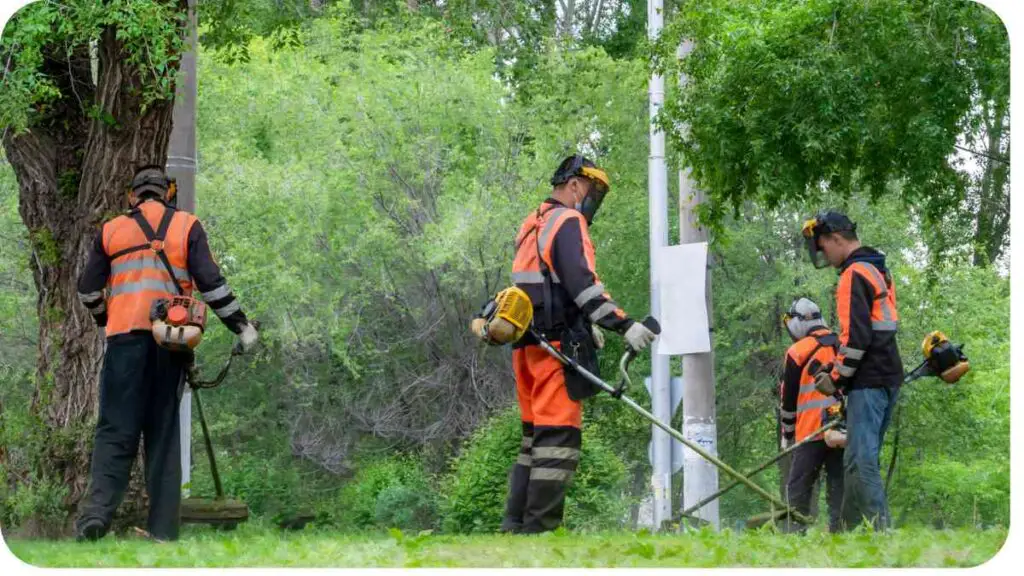
While mowing the lawn can indeed trigger allergy symptoms, it’s important to recognize that it’s not solely due to grass pollen. While grass pollen remains a common allergen, there are other potential triggers present in grass.
For instance, individuals with dust allergies or mold sensitivity may find any outdoor activity challenging, irrespective of initial discomfort. This underscores the importance of understanding the diverse range of allergens present in outdoor environments beyond just grass pollen.
“Mowing the lawn when the grass is damp is not recommended as it can cause potential issues with your lawn mower. Learn more about the problems with mowing wet grass and how to avoid them.”
Can Mowing The Lawn Cause Hay Fever?
Yes, mowing the lawn can indeed trigger hay fever. Hay fever, characterized by symptoms such as sneezing, runny nose, and itchy eyes, is an allergic reaction commonly associated with grass pollen.
Additionally, mowing the lawn may exacerbate asthma symptoms, as grass pollens, which are extremely small, can linger in the air for extended periods before settling. This increased airborne pollen concentration is particularly notable when using power tools like lawn mowers or weed eaters, which emit gasoline fumes, further dispersing allergens.
What Causes Allergies to Grass Pollen?
Grass pollen allergies are primarily triggered by proteins present in the pollen grains, serving as vital components of the plant’s defense mechanism.
These proteins play a crucial role in safeguarding the plant against pests and diseases. However, in individuals allergic to grass pollen, the immune system misidentifies these proteins as harmful invaders.
As a result, the immune system launches an exaggerated response, releasing chemicals like histamine and other inflammatory molecules. These chemicals induce allergy symptoms such as sneezing and a runny nose.
Grass typically releases its pollen into the air during late spring through summer, coinciding with rising temperatures above 70 degrees Fahrenheit (21 Celsius). Low humidity conditions, below 50 percent, exacerbate the situation, as increased moisture evaporation from the body leads to dryness and irritation of the skin and mucous membranes, amplifying allergic reactions.
“If you are experiencing allergies due to your lawn, it may be due to lawn rust. Check out our article on lawn rust and allergies to learn more about how to identify and manage this problem.”
Is It True That Wet Grass Can Cause Allergies?
Absolutely, wet grass can indeed exacerbate allergy symptoms. When grass is damp or wet, pollen dispersal becomes more effortless. If you’ve experienced symptoms like sneezing or watery eyes after mowing your lawn, this could be attributed to wet grass facilitating pollen release.
Similarly, other environmental allergens such as dust and pet dander exhibit heightened irritability when moistened by humidity or rainfall compared to when they’re dry and dispersed through the air. This increased moisture content amplifies their ability to trigger allergic reactions in sensitive individuals.
Does Mowing Make Grass Pollen More Potent?
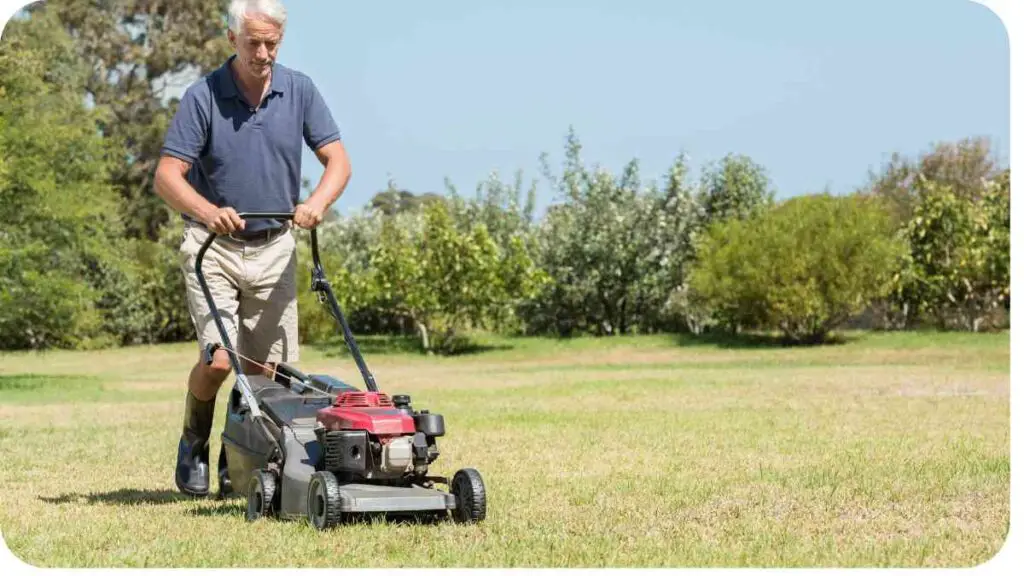
Contrary to common belief, mowing does not enhance the potency of grass pollen. In fact, the opposite holds true.
During periods of low moisture content, such as drought conditions, pollen grains tend to become more resilient to environmental factors like wind gusts.
Conversely, when pollen grains accumulate moisture, their outer layers weaken significantly due to increased surface area exposure. This weakening makes them less resistant to environmental stresses, thereby reducing their potency.
“It can be tough to know when your lawn is beyond saving, but don’t give up hope just yet! Our guide to recognizing when your lawn needs help can help you assess the situation and determine the best solution for your yard.”
Is It Possible To Get A Sunburn From Mowing The Lawn?
Certainly, it’s entirely possible to acquire a sunburn while mowing the lawn. The sun’s rays can reflect off freshly cut grass onto your skin, increasing the risk of sunburn.
Moreover, the frequency of mowing correlates with the likelihood of sunburn occurrence. It’s crucial to recognize that summertime doesn’t always equate to bright sunshine, especially in regions prone to frequent rain or cloudy days due to monsoons or hurricanes.
During periods of limited sunlight, exposure to the sun’s rays after mowing can feel particularly intense. Therefore, regardless of recent weather conditions, it’s essential to prioritize sun protection while engaging in outdoor activities like lawn mowing.
Does Mowing The Lawn Cause Asthma?
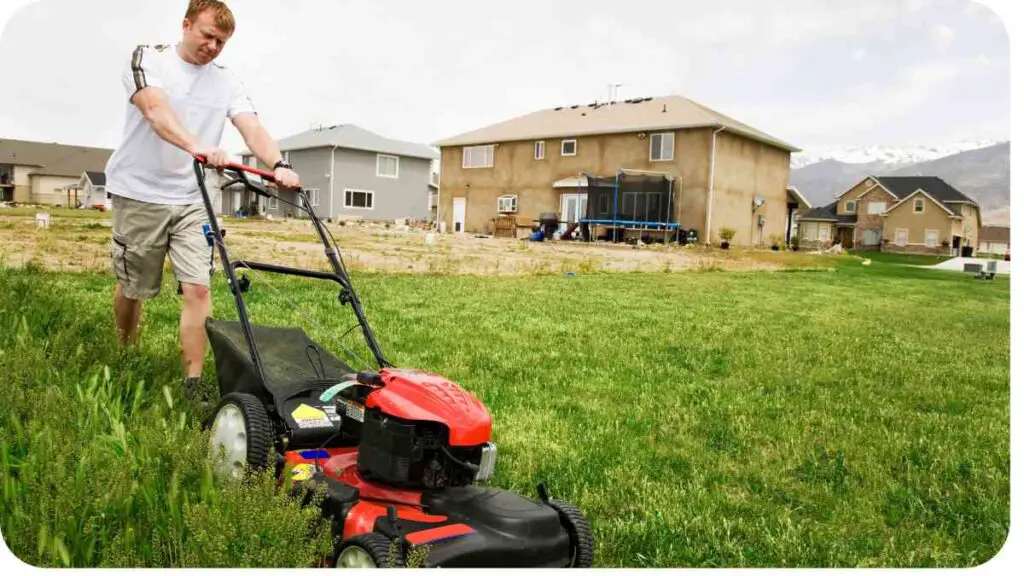
Indeed, mowing the lawn has the potential to trigger asthma symptoms, particularly in individuals sensitive to allergens present in grass pollen.
For those with asthma, exposure to grass pollen while mowing can induce difficulty breathing and wheezing, characteristic symptoms of an asthma attack. Therefore, it’s essential for individuals with asthma to take precautions, such as wearing a mask and minimizing outdoor exposure during peak allergy seasons, to mitigate the risk of exacerbating their condition.
Does Mowing The Lawn Cause Headaches?
Indeed, mowing the lawn can indeed lead to headaches. Allergies, with grass pollen being a primary culprit, are a common cause of headaches. When mowing the lawn, you’re essentially dispersing more grass pollen into the air, which can exacerbate allergy symptoms and contribute to headaches.
Moreover, the frequency of lawn mowing can increase exposure to allergens, heightening the likelihood of experiencing headaches for both yourself and others in proximity to the mowed area. Taking appropriate precautions, such as wearing a mask and limiting outdoor exposure during peak allergy seasons, can help mitigate the risk of headaches triggered by mowing the lawn.
“It’s important to take care of your lawn mower to ensure it runs properly, but even with proper maintenance, they can still overheat. Check out our experience with overheated lawn mowers for tips on avoiding this issue and what to do if it happens.”
Do You Need To Wear Ear Protection When Mowing The Lawn?
Absolutely, wearing ear protection while mowing the lawn is highly advisable. Despite being a common summertime chore, mowing can pose risks to both our bodies and our ears.
Many individuals may overlook the importance of ear protection, dismissing it as unnecessary. However, hearing loss resulting from exposure to loud lawnmower noises is a prevalent issue. According to the National Institute on Deafness and Other Communication Disorders (NIDCD), approximately 20 percent of Americans aged between 12-19 years experience some degree of hearing loss attributable to loud noises, including those generated by lawnmowers.
This statistic underscores the significance of prioritizing ear protection during lawn mowing activities. Whether at home or engaged in outdoor pursuits like hunting, consistent exposure to high-pitched sounds can lead to irreversible hearing damage. Therefore, investing in ear protection is essential to safeguarding one’s long-term auditory health while completing lawn maintenance tasks.
Does Mowing The Lawn Make You Sneeze?
Certainly, mowing the lawn can induce sneezing. The presence of grass pollen, which enters the nose and triggers irritation, is a common culprit behind sneezing during lawn maintenance activities.
When grass pollen irritates the nasal passages, the body’s natural response is to initiate sneezing as a mechanism to expel the irritants. Additionally, other allergens such as dust or pet dander may contribute to sneezing episodes during lawn mowing.
Therefore, if you find yourself sneezing while mowing the lawn, it’s likely due to the presence of grass pollen or other allergens, prompting the body’s defensive reaction to expel these irritants.
Can Mowing The Lawn Make You Cough?
Indeed, mowing the lawn can induce coughing, particularly in individuals sensitive to grass pollen or other allergens present in the environment.
To alleviate cough symptoms while cutting grass, several strategies can be employed. Wearing a face mask or holding your breath while mowing can help minimize inhalation of pollen and allergens, reducing the likelihood of triggering a cough.
Furthermore, switching to a gas-powered mower instead of an electric one can mitigate coughing by preventing the inhalation of pollen particles that may adhere to clothing during mowing.
If these preventive measures fail to alleviate cough symptoms, it may be necessary to consider allergy medication to manage the underlying allergic response effectively.
Is There A Way To Prevent Allergies From Mowing The Lawn?
Certainly, there are measures you can take to prevent allergies while mowing the lawn:
- Wear a Mask: Utilize a mask with a specialized pollen filter to prevent pollen from irritating your nose and mouth. Even if you don’t have allergies, wearing a mask can help minimize exposure to allergens and promote respiratory comfort during lawn mowing.
- Wear Ear Protection: Consider wearing ear protection, especially if you mow the lawn frequently or work outdoors year-round. Prolonged exposure to loud lawnmower noises can lead to conditions like tinnitus later in life. Ear protection can help safeguard your auditory health and reduce the risk of long-term hearing damage.
One Allergy Symptom That May Occur When Mowing The Lawn
One common allergy symptom that may arise when mowing the lawn is a runny nose. Exposure to grass pollen and other allergens during lawn maintenance activities can trigger an allergic reaction, leading to nasal congestion and increased mucus production.
What Causes Grass Allergies?
Grass allergies are primarily caused by a protein present in grass pollen. When inhaled, this protein comes into contact with the mucous membranes of the nose or mouth, initiating an allergic reaction. Symptoms such as sneezing, watery eyes, and nasal congestion manifest as the body’s immune system responds to the perceived threat posed by the grass pollen protein.
Can Mowing The Lawn Trigger Hay Fever?
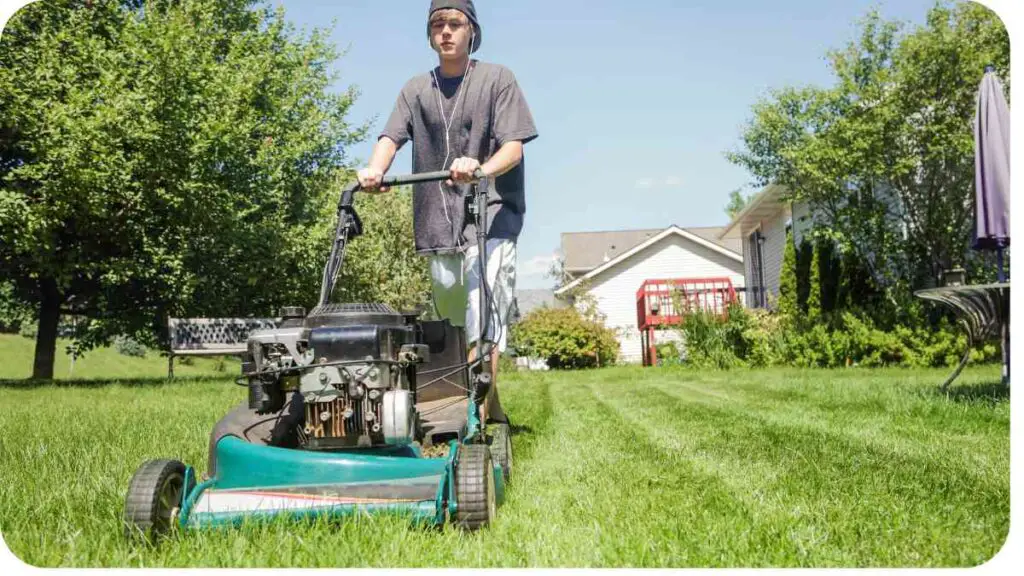
Absolutely, mowing the lawn can indeed trigger hay fever. Hay fever, characterized by symptoms such as sneezing, runny nose, and itchy eyes, is an allergic reaction commonly associated with grass pollen.
When you mow the lawn, grass pollen, which is primarily composed of protein-based particles, is released into the air. For individuals sensitive to grass pollen, exposure to these airborne particles can initiate an allergic reaction, leading to hay fever symptoms.
The severity of the allergic reaction can vary depending on factors such as the individual’s level of sensitivity, as well as environmental conditions like temperature and humidity. Typically, hay fever season commences in May, coinciding with increased grass pollen activity.
“Lawn fertilizer is often used to make yards look lush and green, but it can have negative effects on pets, such as an increased risk of cancer in dogs. Learn more about the connection between lawn fertilizer and pet health and how to keep your furry friends safe.”
Symptoms of Grass Allergy
Grass allergy can manifest through various symptoms, including:
- Runny Nose: Excessive nasal discharge is a common symptom of grass allergy, often accompanied by nasal congestion.
- Sneezing: Frequent bouts of sneezing can occur in response to exposure to grass pollen, a hallmark symptom of allergic rhinitis.
- Itchy Eyes: Irritation and itching of the eyes, along with redness and tearing, are typical symptoms of grass allergy.
- Coughing: Persistent coughing may result from postnasal drip triggered by grass pollen exposure.
- Wheezing: Individuals with asthma or allergic asthma may experience wheezing, chest tightness, and difficulty breathing following exposure to grass pollen.
It’s important to note that severe allergic reactions may also occur, characterized by symptoms such as shortness of breath, hives, swelling of the lips, tongue, or throat. However, these symptoms could indicate a more serious condition such as a sinus infection. If you’re uncertain about the cause of your symptoms, consulting a physician is recommended for proper diagnosis and treatment.
Is It Safe For A Pregnant Woman To Mow Her Own Lawn?
Mowing the lawn can indeed provide exercise, fresh air, and exposure to vitamin D, which are beneficial aspects of outdoor activity.
If you’re pregnant and accustomed to mowing your lawn, there’s typically no reason to discontinue this activity. However, if you’re new to mowing or have a history of asthma, it may be prudent to delegate this task, particularly during the first trimester when you may be more sensitive to physical exertion and environmental factors.
During pregnancy, it’s essential to prioritize your health and well-being. If you have any concerns or discomfort while mowing the lawn, it’s advisable to seek assistance or refrain from the activity until you feel more comfortable. As always, consulting with your healthcare provider can provide personalized guidance based on your individual circumstances.
Is It Safe For Children To Play On Freshly Cut Grass In The Summertime?
It’s advisable to keep children away from freshly cut grass until it has had sufficient time to dry. This precaution is essential because exposure to grass pollen can potentially trigger allergic reactions, especially in children who are more prone to allergies than adults.
Allergic reactions to grass pollen may manifest as symptoms such as difficulty breathing, sneezing, and coughing. Therefore, limiting children’s exposure to freshly cut grass until it has dried can help reduce the risk of allergic reactions and promote their overall well-being during outdoor activities in the summertime.
Home Remedies for Grass Allergies
- Antihistamines: Over-the-counter antihistamines can help alleviate grass allergy symptoms such as sneezing, runny nose, and itchy eyes by blocking the histamine response triggered by exposure to grass pollen.
- Nasal Sprays: Nasal sprays containing corticosteroids or antihistamines can provide relief from nasal congestion, inflammation, and other allergy symptoms associated with grass pollen exposure.
- Apple Cider Vinegar: Some individuals find relief from grass allergy symptoms by using apple cider vinegar. While research is limited, applying diluted apple cider vinegar to the skin as a natural deodorant or using it as a mouthwash after consuming acidic foods like oranges and lemons may offer relief from symptoms.
- Hydration: Drinking plenty of fluids can help thin mucus secretions and ease congestion caused by grass allergies. Staying hydrated supports overall respiratory health and can reduce the severity of allergy symptoms.
- Avoidance Measures: Minimize exposure to grass pollen by keeping windows closed during high-pollen seasons, especially in the springtime. Additionally, mow the grass early in the morning or late in the evening when pollen levels are typically lower. Wearing sunglasses and using air conditioning instead of opening windows can also help reduce pollen exposure.
Does Mowing Make Grass Pollen More Potent?
Contrary to common misconception, mowing the lawn does not increase the potency of grass pollen. Grass pollen is inherently potent, and there is no evidence to suggest that mowing enhances its allergenic properties.
Grass allergy symptoms can be triggered by exposure to grass pollen at any time, regardless of whether mowing has occurred. Whether you’re mowing the lawn or simply spending time outdoors, you remain susceptible to allergic reactions from grass pollen.
Therefore, while mowing the lawn may expose individuals to grass pollen, it does not exacerbate the potency of the pollen itself. Proper allergy management and prevention strategies remain crucial for minimizing symptoms associated with grass allergies.
Can You Get A Grass Allergy From Pets That Spend Time Outdoors?
Grass allergies can indeed be triggered by various types of pollen, including grass pollen. Therefore, it’s essential to take precautions when spending time outdoors, especially during activities such as mowing the lawn.
While allowing pets to spend time outdoors may not initially appear concerning, it’s important to recognize that pets can carry grass pollen on their fur and paws after being outside. This pollen can then be transferred to indoor surfaces, potentially triggering allergic reactions in susceptible individuals.
To keep your family safe during outdoor activities like lawn maintenance, consider the following precautions:
- Limit Exposure: Minimize outdoor activities, particularly during times when grass pollen levels are high, such as during mowing or on windy days.
- Pet Care: Brush and groom pets regularly to remove pollen from their fur. Additionally, wipe their paws with a damp cloth before allowing them indoors.
- Protective Measures: Wear protective clothing, such as long sleeves and pants, and consider using a mask to reduce inhalation of pollen during lawn care tasks.
- Allergy Management: If family members have known allergies to grass pollen, consider taking allergy medication before outdoor activities to reduce the risk of allergic reactions.
Conclusion
For individuals with grass pollen allergies, avoiding direct exposure to mowing activities is the best course of action to prevent symptoms from developing. Consider delegating lawn maintenance tasks to someone else or opting for a push mower that generates less dust and pollen dispersion.
By minimizing exposure to grass pollen during lawn care, you can effectively reduce the risk of allergic reactions while still maintaining a beautiful yard. Prioritizing your health and well-being is paramount, and taking proactive measures to mitigate allergen exposure can significantly improve your quality of life during outdoor activities.
Further Reading
Summer Means Grass Mowing Season: 10 Ways to Combat Allergies: This article provides tips on how to prevent and manage allergies during grass mowing season.
A Guide to Grass Allergies: This guide discusses the causes of grass allergies and possible treatment options.
Outdoor Allergy: Grass Allergy Attack: Learn about the symptoms and treatment options for grass allergies in this article.
FAQs
What causes grass allergies?
Grass allergies are caused by pollen that is released into the air during grass blooming season. This pollen can enter the nose and cause an allergic reaction.
What are the symptoms of grass allergies?
Symptoms of grass allergies can include sneezing, runny nose, itchy eyes, and throat irritation.
Can grass allergies be prevented?
While it may be difficult to completely prevent grass allergies, there are steps you can take to reduce your exposure to pollen. These include staying indoors during peak allergy season, wearing a mask while outside, and keeping windows closed.
What are some treatment options for grass allergies?
Over-the-counter antihistamines can provide relief for mild symptoms. For more severe allergies, immunotherapy (allergy shots) may be recommended.
Are grass allergies dangerous?
While grass allergies are generally not considered dangerous, severe reactions can occur in rare cases. If you experience symptoms such as difficulty breathing or swelling, seek medical attention immediately.

For 15 years, Hellen James has worked in the gardening industry as an expert and landscape designer. During her career, she has worked for a variety of businesses that specialize in landscaping and gardening from small firms to large corporations.

